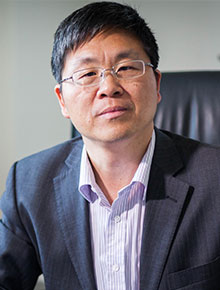Keynote Speakers

Prof. Gordon Huang<<Faculty of
Engineering and Applied Science, University of Regina, Canada
Dr. Gordon Huang is a Tier 1 Canada Research Chair in Energy and Environment, and Executive Director of the Institute for Energy, Environment and Sustainable Communities at the University of Regina, Canada. He holds BSC from Peking University (China), MSc from Simon Fraser University (Canada) and PhD from McMaster University (Canada). Since the 1990s, Huang has led over 150 research projects, produced over 800 peer-refereed international journal papers (with an SCI-based H-index of 51 in Science Citation Index under Thomson Reuters' Web of Science), and supervised over 100 Master/PhD students (with degrees awarded). Over 20 Huang's PhD graduates were appointed as faculty members at universities in Canada, USA, China and Singapore. He is a Fellow of the Canadian Academy of Engineering, and the President of the International Society for Environmental Information Sciences. He also acts as editor-in-chief for Journal of Environmental Informatics (http://www.iseis.org/JEI/), and served the United Nations Development Programme as Chief Scientist for a program of Rural Water Resources Management and Drinking Water Safety. His pioneering work in environmental risk management has been recognized as a significant innovation, and has influenced government and business approaches for tackling environmental challenges and formulating related policies.

Prof. Yongping Li<<Beijing Normal
University, China
Yongping Li is a Changjiang Scholar Professor at Beijing Normal University, China. She receives her MSc and PhD Degrees from the University of Regina, Canada. Her research interests involve in energy and environmental systems analysis, environmental pollution control, and decision making under uncertainty. Dr. Li has led or involved in over 60 energy- and environment-related research projects supported by industrial, governmental and international organizations. She has produced more than 400 peer-refereed international journal papers (with a SCI-based H-index of 50). She has been continuously selected as a highly cited scholar in the field of “Environmental Science” (by Elsevier) since 2013. She supervised over 70 Master/PhD students. Dr. Li was received a number of awards such as Distinguished Young Scientist Award, New Century Excellent Talents in University, the National Natural Science Funds for Distinguished Young Scholar, the National Award for Youth in Science and Technology, and the National Award for Youth Female Scientist.

Prof. Bangqin Huang<<Xiamen University, China
Prof. Bangqin Huang is a Nanqiang Distinguished Professor of Xiamen University, a recipient of The National Science Fund for Distinguished Young Scholars, and currently the first director of National Observation and Research Station for the Taiwan Strait Marine Ecosystem. He is mainly engaged in marine ecology, marine ecosystems and global change research. He also presided over the National Key Research and Development Project, the National Natural Science Foundation of China key projects, and the Joint Foundation of China key projects. He has made outstanding achievements in the evolution of the ecosystem of the marginal sea, the mechanism, and the regulatory mechanism of carbon sequestration and storage by biological pumps, etc. He has published a series of research papers in Geophysical Research Letters, Limnology and Oceanography, Water Research and other mainstream journals in the field of earth science, marine science and environmental ecology. He was awarded the Second Prize of National Teaching Achievement Award as the main accomplisher. He is also the Executive Director of the Ecological Society of China, Vice Chairman of the Marine Ecology Specialized Committee of the Ecological Society of China, Vice Chairman of the Marine Environmental Protection Specialized Committee of the Chinese Society for Environmental Science, and Vice Editor-in-Chief of the Journal of Oceanology and Limnology and the Journal of Applied Oceanography.

Prof. Caterina Valeo<<University of Victoria, Canada
Dr. Caterina Valeo is a Professor in Mechanical Engineering at the University of Victoria and a Professional Engineer in the Province of British Columbia. After receiving undergraduate degrees in Physics and later, a second one in Civil Engineering, both from the University of Toronto, she went to McMaster University to complete a Masters degree and eventually a PhD specializing in urban water resources in 1998. She worked as an academic at the University of Manitoba for 2 years then moved to Geomatics Engineering at the University of Calgary in 2000 where she began developing what has now become a prolific 20 year career conducting research and teaching in Environmental Information Sciences. She moved to the Department of Mechanical Engineering at the University of Victoria in 2011 to continue her interdisciplinary research that merges information science with environmental science and engineering. Her research interests and areas of application are wide and varied and range from researching the impacts of global scale changes on forestry and water supply to developing sensors and models to describe the role of bacteria and biofilm in treating polluted water. She has more than 200 publications including 3 co-authored books on topics as diverse as Environmental Hydraulics and Digital Terrain Modelling. She has collaborated with over 100 researchers across the globe, has received and participated in several millions of dollars in grants and is the recipient of numerous accolades including the 2014 Award of Distinguished Scientist from the International Society for Environmental Information Sciences. Today Dr. Valeo runs the Biofilm Research Laboratory and the HAL Research Site at the University of Victoria and continues to conduct multi-collaborative research that uses Environmental Informatics tools to create sustainable solutions to society’s modern problems.


